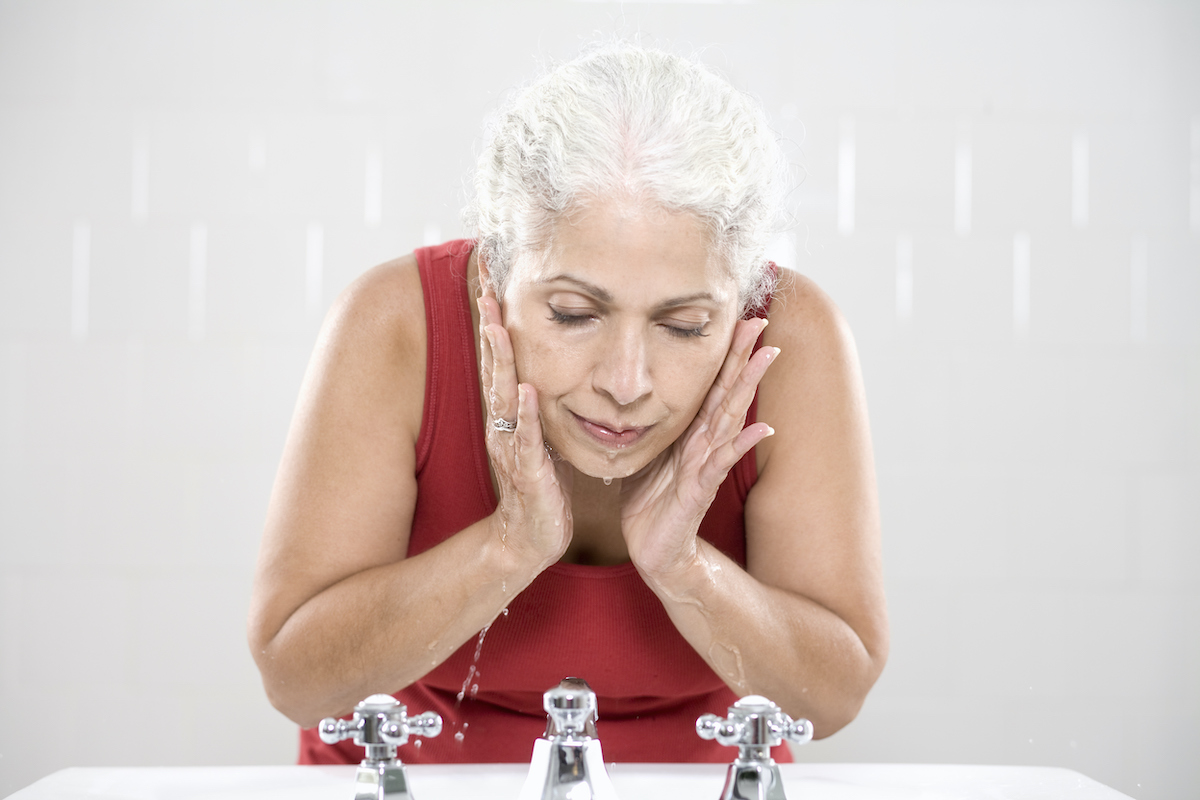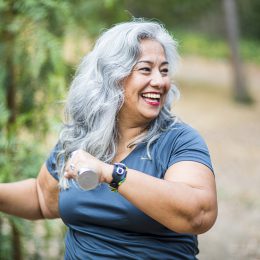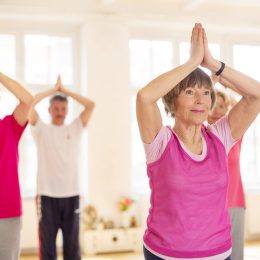4 Things Dermatologists Wish Older Adults Knew About Skin Care
Healthy aging includes taking care of your skin. Here’s what you need to know.

Some skin changes that come with getting older deserve a little celebration. Those laugh lines and crow’s-feet are both signs of a long and joyful life.
There are others, however, that are worth some extra attention. For instance, the outer layer of skin gets thinner as you age, even though the number of cell layers stays the same, according to the U.S. National Library of Medicine (NLM). Plus, changes in your connective tissue can reduce the skin’s strength and elasticity.
Because skin thins and weakens over time, taking proper care of it not only helps maintain its look and feel, it helps prevent injuries and more. After all, your skin protects delicate nerve endings and helps safeguard bones, muscles, and organs. Here’s what you need to know to keep your skin healthy for life.
Skin Care Tip #1: It’s Never Too Late to Prevent Sun Damage
Skin changes happen for many reasons, but sun exposure is the biggest one by far. That means the most important skin care tip is to use sunblock regularly, even if you haven’t before, says dermatologist Lily Adelzadeh, M.D., a board-certified dermatologist in California. Sunblock isn’t just for slowing down skin aging and minimizing dark spots, but also for preventing skin cancer, she says.
Dr. Adelzadeh recommends using a broad-spectrum sunscreen—meaning it protects against harmful UVA and UVB rays—with a sun protection factor (SPF) of 30 or higher. She also prefers a mineral-based sunblock made with zinc oxide or titanium dioxide, as those can be less irritating than chemical sunscreens that include ingredients such as oxybenzone or avobenzone. (The Food and Drug Administration is currently evaluating the safety of 12 chemical sunscreen ingredients that get absorbed into the skin.)
Another tip to protect against sun damage? Turn to vitamin C, and not just from eating citrus fruits. “I recommend everyone apply a vitamin C serum, since it’s an antioxidant,” Dr. Adelzadeh says. “That will help fight the harmful effects our skin encounters on a daily basis from pollution and the sun.”
Her favorite choice is a vitamin C serum by SkinCeuticals, because it also has skin-boosting ingredients like vitamin E and ferulic acid. There are also more budget-friendly options such as TruSkin Naturals and Mad Hippie. Keep in mind that you’ll use only a couple of drops per day, so it should last for several months.
Whichever serum you use, Dr. Adelzadeh says that the best time to apply it is in the morning, right after washing your face, before you put on any moisturizers or sunscreen.
Skin Care Tip #2: Opt for a Non-Soap Cleanser
Even if you’ve been using soap all your life—and honestly, who hasn’t?—the way the skin on your face and body tends to get dry and sensitive as you age can turn soap into a problem instead of a solution, says Adam Mamelak, M.D., a board certified dermatologist based in Austin, Texas.
“Traditional soaps pull out natural and essential oils that hydrate and protect our skin,” he says. “Switching to a non-soap, fragrance-free cleanser will allow your skin to retain its protective and hydrating oils, as well as maintain moisture and resilience.”
In terms of specific options, Cetaphil is an affordable choice that’s widely available and recommended by dermatologists.
Skin Care Tip #3: Take Wound Prevention Seriously
Because aging skin is thinner and more fragile, it repairs itself more slowly than younger skin. That means wound healing may be up to four times slower, according to the NLM. This can increase your risk of pressure ulcers (also known as pressure sores or bedsores) and infections, and if you deal with blood vessel issues, immunity problems, or diabetes, healing may be impeded even more.
What does this mean for you? It’s crucial to help prevent pressure damage by treating skin gently—skip the aggressive exfoliation, for example—and moving more often. If you’ve been sitting for an hour or more, just getting up from your chair and walking for a few minutes can improve blood flow to your skin.
Subscribe to our newsletter
It's quick and easy. You could be one of the 13 million people who are eligible.
Already a member? Click to discover our 15,000+ participating locations.
Follow Us
Skin Care Tip #4: Healthy Lifestyle Habits Matter
In addition to limiting your direct sun exposure, some other habits you use to stay healthy can make a huge difference to your skin, says Chesahna Kindred, M.D., dermatologist at Kindred Hair & Skin Center in Columbia, Maryland.
That includes getting quality sleep, not smoking, managing stress, exercising regularly, and eating nutritious foods—especially fruits and vegetables, since they contain antioxidants, compounds that slow down cell damage in your skin and the rest of your body. Even hanging out with your friends can be a skin care tonic because it improves mood, which Dr. Kindred says is like a natural facelift.
“When you feel happy and vibrant, you have a natural glow about you, and that’s not only about the skin care products you use,” she says. “Good health shines through no matter your age, so keep up the beneficial habits.”
Need a little help sticking with (or starting) those healthy habits? Check out these nine small changes that add up quickly.
Check Your SilverSneakers Eligibility Instantly
SilverSneakers members can go to thousands of gyms and fitness locations across the nation and take SilverSneakers LIVE online classes that are designed for seniors of all levels. If you have a Medicare plan, it may include SilverSneakers—at no additional cost. Check your eligibility instantly here.
Not eligible for SilverSneakers? You can still get 200+ free SilverSneakers On-Demand videos and stay in touch with us by creating your online account.





